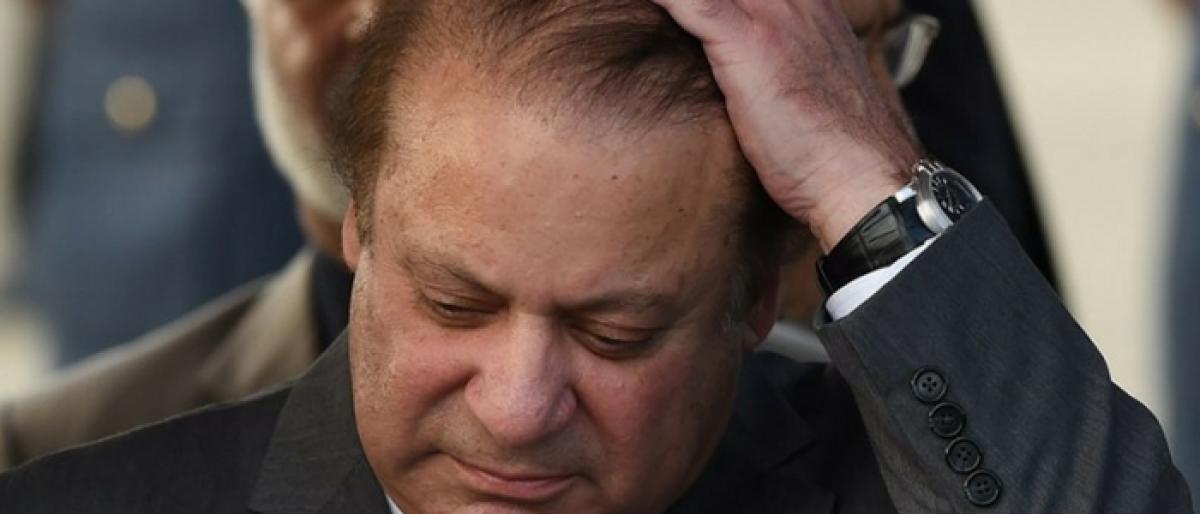Live
- Resolve public grievances on spot: Collector
- How Groundwater Depletion Is Shifting Earth’s Pole and Impacting Our Future
- Textiles parks to be set up in Anantapur & Kurnool dists
- 2nd batch of capacity building programme begins at IIM-V
- Blooming Minds receives ‘Best School’ award in TG
- Nagarkurnool: Students told about harmful effects of tobacco
- Unlock Exclusive Rewards with Daily Redemption Codes in Garena Free Fire MAX
- Srikakulam youth Tripurana Vijay to makes IPL debut with Delhi Capitals
- RRR oustees urge KTR for help
- Mahabubnagar: Illegal sand mining rampant
Just In

The Pakistan Supreme Court on Friday disqualified Prime Minister Nawaz Sharif in the Panama Papers scandal, plunging the country into a political crisis at a time when it is facing brittle economy and surge in militancy.
A 3-time PM who never completed his tenure
Islamabad: The Pakistan Supreme Court on Friday disqualified Prime Minister Nawaz Sharif in the Panama Papers scandal, plunging the country into a political crisis at a time when it is facing brittle economy and surge in militancy.
Nawaz Sharif, known as the ‘Lion of Punjab’, became the Prime Minister in the politically unstable Pakistan for a record three times, but every time he was forced to quit in the middle of his term -- first by the presidency, then the military and now the judiciary.
Sharif’s third term in office comes to an unceremonious end following a verdict by a five-member bench of the country’s Supreme Court into his family’s assets and projected incomes. The court’s verdict also barred him from electoral politics for at least five years.
Sharif was a year away from completing his first full term in power - a feat so far unprecedented in Pakistan’s political history.
Maryam Nawaz, Sharif’s daughter, is also under the scanner by a Joint Investigation Team looking into allegations against the family's offshore companies and alleged money laundering after the Panama Papers leak revealed the family allegedly funnelled funds to acquire assets internationally.
The Supreme Court has directed the National Accountability Bureau, Pakistan’s main anti-corruption watchdog, to file a case against Sharif and his children in an anti-corruption court within 6 weeks.
Sharif, who leads the country’s most powerful political family and the ruling PML-N party, successfully managed to swim through all the “tsunamis” since he assumed power for the third term in June 2013, but a Supreme Court ruling against him in the Panamagate case struck a heavy blow to his career.
The 67-year-old wily political leader, seen by many as someone who can fix the country’s problems such as economy and the terrorism, found himself besieged by problems after Panama papers showed illegal money laundering by him in 1990s when he twice served as Prime Minister to purchase assets in London.
International Consortium of Investigative Journalists disclosed that Sharif’s children — Mariam, Hassan and Hussain - were the beneficial owners of offshore companies set up in the British Virgin Islands, a known tax haven.
The revelation forced Sharif to address the nation twice and disclose a detailed account of his family’s businesses in the National Assembly, explaining how his late father had built the business empire, which was the source of income used to buy properties in London and other holdings.
In May, the Supreme Court set up a six-member joint investigation team (JIT) to investigate the charges against Sharif and his family.
Sharif, his sons, daughter and brother Punjab Chief Minister Shahbaz Sharif all appeared before the JIT which comprised officials from Pakistan’s powerful spy agency ISI and the military intelligence.
In its report submitted to the apex court on July 10, the JIT said the lifestyle of Sharif and his children were beyond their known sources of income, and recommended filing of a new corruption case against them.
Sharif dismissed the report as a “bundle of baseless allegations” and refused to quit, despite demands to do so from several quarters, including opposition political parties.
On July 21, the court reserved its verdict after concluding the hearing and ruled against Sharif on July 28.
A steel tycoon-cum-politician, Sharif had served as the Prime Minister for the first time from 1990 to 1993.
During his tenure, Sharif developed serious differences with conservative president Ghulam Ishaq Khan, who dissolved the National Assembly using his reserve powers in April 1993. In July, Sharif resigned under pressure from the army but made a settlement that resulted in the removal of Khan as well.
Sharif’s second term as Prime Minister from 1997 ended in 1999 when then powerful Army chief Pervez Musharraf staged a bloodless coup.
In a dramatic fall from grace, Sharif ended up in jail, convicted of hijacking charges for trying to stop a plane carrying Musharraf from landing.
He then went into exile in Saudi Arabia and did not return to Pakistan until 2007, when he teamed up with the PPP to force Musharraf from office. Both of Sharif’s first two stints had ended in the third year of his tenure.

© 2024 Hyderabad Media House Limited/The Hans India. All rights reserved. Powered by hocalwire.com







